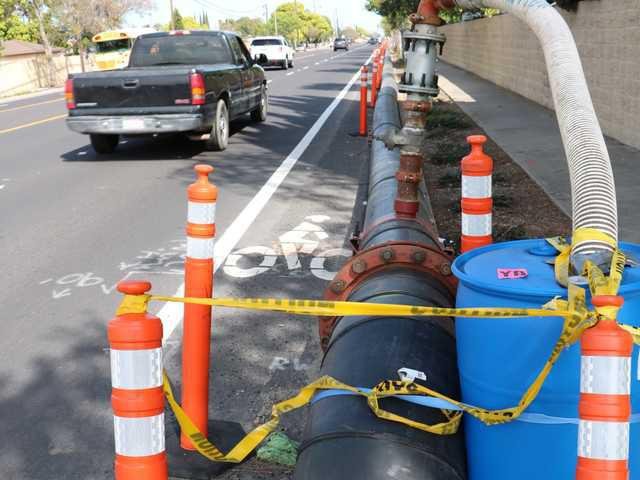There are four Manteca municipal rate hikes on tap this year.
Three of them — sewer, water, and solid waste collection — will cover operation and maintenance costs. Those rates will affect every household, every business, and every institution.
The fourth is a hike on connection fees charged growth in order to fund the next wastewater treatment plant expansion.
When all is said and done, it will be impossible for a household to have a Manteca municipal utility bill less than $100 a month once you combine flat sewer rates now ar $43.39, water base rate now at $17.15 and medium sized waste garage cart charges now at $32.61 along with actual water consumption.
The first rate hike to advance to the council will be the least problematic and arguably the smallest.
That’s because garbage rates were adjusted in March 2017 and phased in over four years.
The rate hike took the cost of a 65-gallon cart from $25.49 to $32.61 for a $7.12 month increase.
It was jarring at the time given the city had gone 11 years without raising solid waste rates. To cushion the impact, the city increased the monthly rates on an annual basis over four years. That meant the monthly rate increased less than $2 on Jan. 1 of each year and then stayed that way until another sub-$2 a month hike was implemented on the next Jan. 1.
This time around, the rate hike will be driven by increased costs in collecting solid waste including salaries and operating expenses such as a truck fleet, increased landfill costs, and the financial burden of new state mandates regarding recycling and diverting items such as food waste from the landfill to be repurposed for other uses.
Sewer & water rate hikes
expected to be significant
The biggest hits to households will be with sewer and water rates.
And even though there is less per capita water being consumed which in turn reduces the per capita wastewater being treated, rates haven’t been raised for going on 14 years.
Making matters worse the city sometime mid-decade opted to “borrow” money from other city funds to do maintenance work that includes replacing water and sewer lines that have failed or were on the verge of failing. That money has yet to be paid back to the accounts they were taken from as required by law.
Add to that the need to replace aging wastewater treatment plant infrastructure, rising power cost to operate both the wastewater treatment plant and city water wells, salaries and benefits, and the skyrocketing cost of chemicals.
The city, nearly three years ago, unearthed the borrowing issue as well as finally realized the fact rates hadn’t been increased when then mayor Ben Cantu pressed for an outside look at the city’s finances.
That outside look — while it found no signs of criminal activity — did uncover bad accounting practices that have since been addressed. The city’s final catch-up audit for past years is expected to be completed in the coming month.
How the mess was created can be directly tied to the turnover in city managers, public works directors and finance directors.
It is now on the shoulders of Interim City Manager Toni Lundgren to correct past errors and omissions, so to speak.
“No one likes rate increases including Toni Lundgren,” Lundgren said, Wednesday. “But we need to make sure the city still has water flowing and toilets can flush. . .”
Lundgren said keeping essential infrastructure operating is a basic public health and safety concern that the City of Manteca must make a top priority.
Two rate studies were
launched during 2021
The City Council on October 2021 hired Stantec Consulting Services for $1,048,000 to devise a wastewater master plan and conduct a sewer rate study.
In June 2021, the council obtained the services of HyrdroScience Engineers for just under $1 million to develop a citywide water and water rate study.
There is no doubt rates have to be raised. It’s an assessment built on a number of factors.
*There hasn’t been a water or sewer rate increase since 2009.
*The two enterprise accounts were kept going by inter-fund loans from other accounts such as growth fees collected for new street work that has to legally be paid back with interest.
*Inflation is increasing the cost of ongoing maintenance and operations.
*The city’s utility funds that include solid waste, water, and sewer had roughly $2 million in utility billings that hadn’t been collected as of July 1, 2021.
*There is a need to fund replacement projects going forward for aging pipes and equipment.
The staff report for the October 2021 agenda item indicates the last rate increase was in 2013. That, however, is only true on paper.
The council back in 2008 adopted four annual rate increases for sewer and water that covered projected operating and maintenance costs as well as building up set aside funds for replacement projects.
However, the same council — and the council seated over the next election cycles — subsequently suspended each of the annual hikes that were supposed to go into effect in 2010, 2011, 2012, and 2013 based on the last rate hike studies the city commission.
They did so at the depth of the Great Recession and after they obtained concessions that cutback pay and eliminated agreed upon pay hikes for city workers including those whose jobs are with the city utility divisions that are funded through users who pay into enterprise accounts.
The rationale was the city was cutting costs so they would provide stressed households and businesses with relief by suspending the rate hikes.
Those concessions at the time amounted to a 20 percent reduction in wage costs. Since then the lost wages have been restored and then some.
Then mostly without the knowledge of elected officials city staff instituted interfund borrowing to underwrite major water and wastewater projects to avoid the funds from being depleted.
To contact Dennis Wyatt, email dwyatt@mantecabulletin.com






